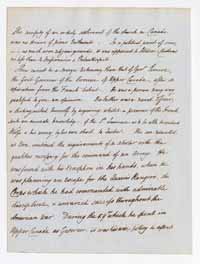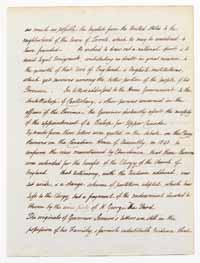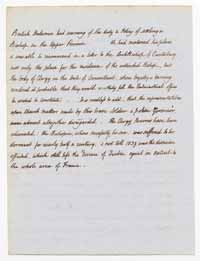N.D. [post 1840] - Sketch of Simcoe as Governor of Canada.
CWF Rockefeller Library, Special Collections - SCMS1930.6

The re[illegible]ty of an orderly settlement of the church in Canada
was no dream of pious enthusiasts. In a political point of view,
[faded] as much as on religious grounds, it was apparent to Soldiers & Civilians
no less than to Missionaries & Philanthropists.
There cannot be a stronger testimony than that of Genl
Simcoe,
the first Governor of the Province of Upper Canada, after its
separation from the French District. He was a person every way
qualified to give an opinion. His father was a Naval Officer,
& distinguished himself by acquiring, whilst a prisoner of the French,
such an accurate knowledge, of the St. Lawrence as to be able to conduct
Wolfe & his army by his own chart to Quebec. The son educated
at Eton, combined the acquirements of a scholar with the
qualities necessary for the command of an Army. He
was found with his Xenophon in his hands, when he
was planning an escape for the Queen's Rangers, the
Corps which he had commanded with admirable
discipline, & unvaried success throughout the
American War. During the 5 yrs
which he spent in
Upper Canada as Governor, it was his wise policy to attract
 as much as possible the loyalists from the United States to the
as much as possible the loyalists from the United States to the
neighborhood of the town of Toronto, which he may be considered to
have founded. He wished to draw out a national spirit, & to
[ami]t loyal emigrants, contributing no doubt in great measure to
the growth of that love England & English institutions,
which yet survives among the better portion of the people of his
Province. In letters addressed to the Home Government to the
Archbishop of Canterbury, & other persons concerned in the
affairs of the Province, the Governor distinctly asserts the necessity
of the appointment of a Bishop for Upper Canada.
Extracts from these letters were quoted in the debate on the Clergy
Reserves in the Canadian House of Assembly in 1840 to
confirm the view maintained by Churchmen, that those Reserves
were intended for the benefit of the Clergy of the Church of
England. that testimony with the evidence adduced, was
set aside, & a strange scheme of partition adopted, which has
left to the clergy but a fragment of the endowment devoted to
them by the wise piety of K. George the Third.
The originals of Governor Simcoe's letters are still in the
possession of his Family, & furnish indubitable evidence that
 British statesmen had warning of the duty & policy of settling a
British statesmen had warning of the duty & policy of settling a
Bishop in the Upper Province. He had matured his plans
& was able to recommend in a letter to the Archbishop of Canterbury
not only the place for the residence of the intended Bishop, but
the body of clergy in the State of Connecticut, whose loyalty & learning
rendered it probable that they would worthily fill the ecclesiastical offices
he wished to constitute. It is needless to add, that the representations
upon Church matters made by this brave soldier & politic Governor,
were almost altogether disregarded. The Clergy Reserves have been
alienated: the Bishopric, whose necessity he saw, was suffered to lie
dormant for nearly half a century, & not till 1839, was the division
effected, which still left the Diocese of Quebec equal in extent to
the whole area of France.